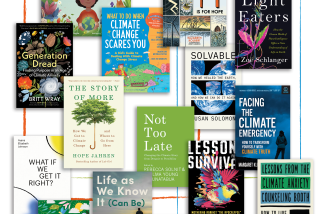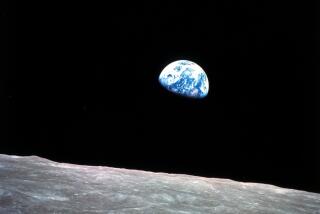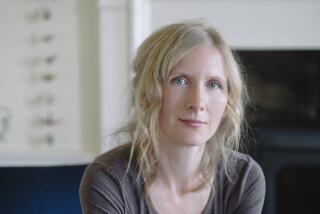Capturing the big picture on Earth Day
- Share via
The rarest view in humanity -- Earth from afar -- moves many of the lucky few observers to tears and gives them a new appreciation of that blue marble we call home.
When astronauts return from space, what they talk about isn’t the brute force of the rocket launch or the exhilaration of zero gravity. It’s the view.
Only two dozen men -- those who journeyed to the moon -- have seen the full Earth view. Most U.S. spaceflight has been in low orbit where only a piece of the planet can be seen -- a lesser but still impressive sight. Those travelers have seen the curvature of Earth, its magnificent beauty, its fragility, and its lack of borders.
The first full view of Earth came from the moon-bound Apollo 8 during the waning days of a chaotic 1968. Apollo 8 astronaut Bill Anders put it all in perspective in a documentary: “We came all this way to explore the moon, and the most important thing is that we discovered the Earth.”
Some of the photos Anders took were used on posters and pins on the first Earth Day in 1970. They’ve been “an environmental staple of Earth Days ever since,” said Denis Hayes, the first Earth Day coordinator.
For Earth Day this year -- which is today -- the Associated Press asked space travelers to recall what it’s like to see Earth from above:
‘It was the only color we could see in the universe.... We’re living on a tiny little dust mote in left field on a rather insignificant galaxy. And basically this is it for humans. It strikes me that it’s a shame that we’re squabbling over oil and borders.’
-- Bill Anders
Apollo 8 astronaut whose photos of Earth became famous
“It’s hard to appreciate the Earth when you’re down right upon it because it’s so huge. It gives you in an instant, just at a position 240,000 miles away from it, [an idea of] how insignificant we are, how fragile we are, and how fortunate we are to have a body that will allow us to enjoy the sky and the trees and the water.... It’s something that many people take for granted when they’re born and they grow up within the environment. But they don’t realize what they have. And I didn’t till I left it.”
-- Jim Lovell
Apollo 8 and 13
“The sheer beauty of it just brought tears to my eyes. If people can see Earth from up here, see it without those borders, see it without any differences in race or religion, they would have a completely different perspective. Because when you see it from that angle, you cannot think of your home or your country. All you can see is one Earth....”
-- Anousheh Ansari
Iranian American space tourist who flew last year to the International Space Station
“Up in space when you see a sunset or sunrise, the light is coming to you from the sun through that little shell of the Earth’s atmosphere and back out to the spacecraft you’re in. The atmosphere acts like a prism. So for a short period of time you see not only the reds, oranges and yellows, the luminous quality like you see on Earth, but you see the whole spectrum: red, orange, yellow, blue, green, indigo, violet. You come back impressed, once you’ve been up there, with how thin our little atmosphere is that supports all life here on Earth. So if we foul it up, there’s no coming back from something like that.”
-- John Glenn
First American to orbit the Earth (1962) and former U.S. senator
“I think you can’t go to space and not be changed, in many ways.... All of the teachings of the Bible that talk about the creator and his creation take on new meaning when you can view the details of the Earth from that perspective. So it didn’t change my faith per se, the content of it, but it just enhanced it, it made it even more real.”
-- Jeff Williams
Spent six months on the space station and set a record for most photos taken of Earth
“Earth has gone through great transitions and volcanic impacts and all sorts of traumatic things. But it has survived.... I’m not referring to human conflicts. I’m referring to the physical appearance of the Earth at a great distance. That it generally is mostly very peaceful [when] looked at from a distance.”
-- Buzz Aldrin
Second man to walk on the moon
“I see the deep black of space and this just brilliantly gorgeous blue-and-white arc of the Earth and totally unconsciously, not at all able to help myself, I said, ‘Wow, look at that.’ ”
Kathy Sullivan
First American woman in a spacewalk, recalling what she said when she saw Earth in 1984
“From up there, it looks finite and it looks fragile and it really looks like just a tiny little place on which we live in a vast expanse of space. It gave me the feeling of really wanting us all to take care of the Earth. I got more of a sense of Earth as home, a place where we live. And of course you want to take care of your home. You want it clean. You want it safe.”
Winston Scott
Two-time shuttle astronaut who wrote the book “Reflections From Earth Orbit”
“You change because you see your life differently than when you live on the surface every day....We are so involved in our own little lives and our own little concerns and problems. I don’t think the average person realizes the global environment that we really live in. I certainly am more aware of how fragile our Earth is and, frankly, I think that I care more about our Earth because of the experiences I’ve had traveling in space.”
-- Eileen Collins
First female space shuttle commander
“You can see what a small little atmosphere is protecting us. You realize there’s not much protecting this planet, particularly when you see the view from the side. That’s something I’d like to share with everybody so people would realize we need to protect it.”
-- Sunita Williams
Astronaut Who has been living on the International Space Station since Dec. 11
“I left Earth three times. I found no place else to go. Please take care of Spaceship Earth.”
-- Wally Schirra
Flew around Earth on Mercury, Gemini and Apollo missions in the 1960s
AP writers Rasha Madkour in Houston, Mike Schneider in Cape Canaveral, Fla., and Alicia Chang in Los Angeles contributed to this report.
More to Read
Sign up for The Wild
We’ll help you find the best places to hike, bike and run, as well as the perfect silent spots for meditation and yoga.
You may occasionally receive promotional content from the Los Angeles Times.






